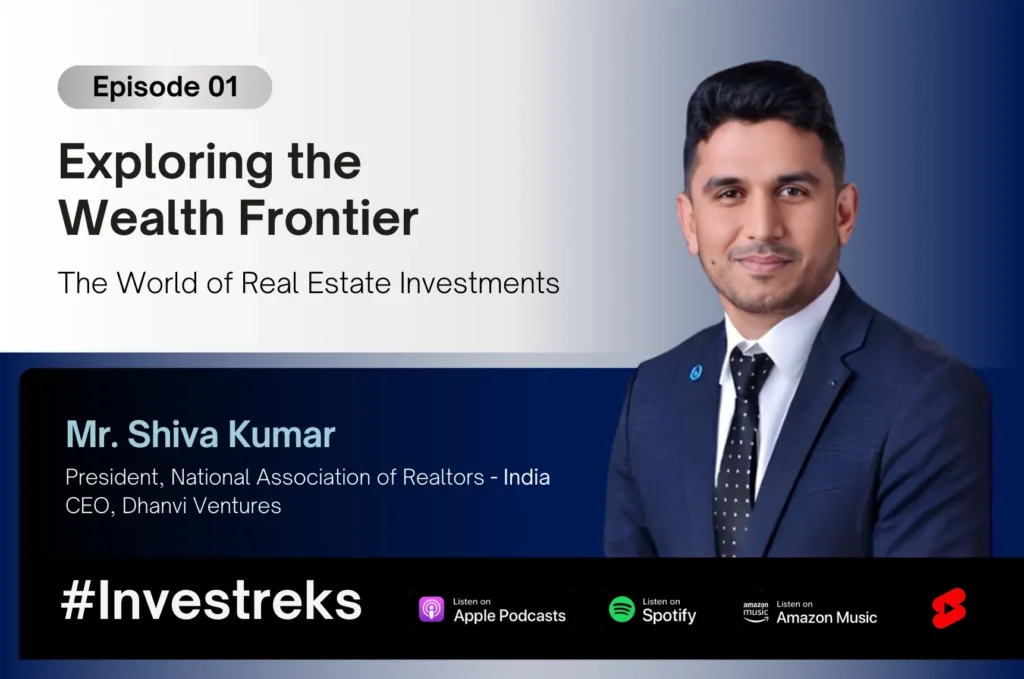Exploring the Wealth Frontier | Investreks EP 01 | Ashton Gray Investments
Investing wisely is a crucial step toward securing your financial future and building wealth.

Mr. Shiva Kumar
- On

Table of Contents
Tag
Share on
Speaker 1 0:33
In this inaugural episode, we are honored to welcome our distinguished guest, Mr. Shiva Kumar. With an impressive track record of over 18 years in the real estate sector, he brings a wealth of expertise to the table. Mr. Shiva Kumar is renowned for his proficiency in handling significant land transactions and serving as a trusted consultant on building sanction and government protocols to substantial real estate projects in Tamil Nadu. Moreover, he holds the role of founder and CEO at G ventures, a company actively involved in various derivative ventures, including brokerage services nationwide license service in Tamil Nadu and Karnataka as well as jealousy WTS in one. Let’s listen to him now.
Speaker 1 1:27
Welcome Mr. Shiv Kumar, I’m very excited to have you on a very first episode of invest tracks, how’re you doing today?
Speaker 2 1:33
Thank you very much. Kind of you to have called me here for your first session of investor. That’s super great session, definitely.
Speaker 1 1:39
And we’re also looking forward to the scene. So to you know, kick things off, let’s dive into the concept of investments. So investments could you know, mean different things to different people, the way you perceive investments could be very different from the way I perceive investments. So what I’d like to understand from you is, what do you think about investments when it comes to a broader spectrum of things where people are trying to secure their financial future? Okay.
Speaker 2 2:05
Investment, let’s look at it this way, to understand the concept of a certain idea, let’s go backwards. If you look at history, after the 1757, when the American Revolution happened, until then, people did not speak of investment, they spoke about insurance, because most of the lands the farmlands, the farmer would want to secure his crop for next year. So for that he would insure his produce, save it so that the next year if there’s any calamity, it gets saved. Now, what happened is investment came up after capitalism and credit came up. So when I knew I could borrow money at a rupee and make it 10 rupees, I had the leverage of credit, right? So credit in capitalism actually lead to growth. So investment from insurance investment game investment is a thought process of growth. Right? So today, if you ask me, Why would somebody invest? Like unlike the earlier years, today, you invest towards growth? How do you do that? You do that through different methodologies available in the market could be real estate, which we are in could be stocks could be anything. But investment, per se, is to beat the certain amount of money that you’re making, to make it a little more higher. That’s why you invest so that you safeguard yourself for the future. So I think this is how investment came as a thought process.
Speaker 1 3:34
Perfect. Yes. So you talking about building wealth? Right? The concept of wealth building came in during that time. Okay, perfect. So thank you so much. Yeah, so like you said, there are so many, you know, investment options that we can look at. But what I believe is, it’s important for one to, you know, do their homework in terms of, you know, the financial aspects when it comes to investments are their risk tolerance levels, the long term and short term goals and things like these, so I believe that doing so would help them set the coordinates to their financial journey. So that’s basically like laying a track to their financial journey. Right. So and also to talk about, you know, inflation, inflation isn’t something new to us. So inflation has been impacting many lives around the world, and there is no denying to that. So inflation is one of the reasons why people invest in real estate because the appreciation level of real estate is really higher when compared to the inflation rate. And thus they look at real estate as a medium to build wealth. So apart from inflation, what do you think are the other factors that are basically driving that you know, forced for people to invest in real estate? See, if
Speaker 2 4:37
you see investment per se happens in a lot of sectors, investment happens to predominantly people used to invest in gold, and then in real estate, so these are hard assets, okay, until the 1870s in the Bombay Stock Exchange came up and said that you can start sharing share and start trading shares and bonds. Now, India as a country, evolves, then They started practicing the art of trading in the stock markets, right? Inflation, if you see inflation for India, say post independence, we’ve been hovering around less than the, you know, 810 percentage. Your question is What how do you beat inflation? And how does this happen? And why do we Why do people choose real estate as a model to invest in real estate, right? India, as a country, if you see, people choose most of the people who have bought land, have beaten inflation, to say, from 1970s, when the inflation was the highest from then, till here, when you had the last COVID was your last crisis. And then you had 2008 2009, you had the global economic crisis, all these times, people who held on to land beat inflation. I’m not saying there are stocks that did not beat inflation. But my point is, real estate is a very tangible asset, right. And real estate has been a very, you know, proven method where people buy land, but when you buy an apartment or a home, you know, there are certain markets in India that may have given you the appreciation, but not in entirety. Right. So I why people choose real estate, because it has proven this from 70s to 80s to 90s, although you know, gold must have done its work, stocks must have done its work bonds have a certain you know, but their returns are very fixated, the investment is fixed said the returns are fixed, and the risk is very nice. Stocks, your risks are very high, your returns, it could also be very high. Real estate is not like that. So real estate for you is very classified, you know whether they should move northwards, whether they should move southward. And we are the market are very resilient, you would not want to sell a property that you picked at 100 rupees at 95, you would never do that you would wait for the day that it becomes 101 are the worst 100. Right. So in resilience, real estate has has become a good product through resilience. Yeah,
Speaker 1 6:58
makes absolute sense. We wait for that breakeven point, you know, we don’t go anywhere below that point. Right. And apart from inflation, what other factors do you think are influencing the strength of people moving towards Charlie state?
Speaker 2 7:11
Say, apart from inflation you see today? People don’t I mean, everybody thinks that the shortest distance between two dots is always a straight line. Right? And money has to multiply by itself. But today, we are in a fast paced world, right. As you say, before 2014 until the digitization era came in India, to understand the credit worthiness of an individual is very difficult. Today, you know, you can track any transaction through, you know, his mobile phone or his email id and you’ll understand the credit worthiness of an individual. Now, every individual today wants to make himself credit worthy. Right? Whether it’s 1x 2x 3x 4x, I don’t know depends on the aspiration that people have. Now hearing so much news about Indian real estate, India being at the tip of consumerism, where you know, Apple has opened its doors in India, they did the same in China in 2008, when China’s economy was about four and a half trillion dollars, and India’s economy is about three and a half trillion dollars. And today, China has 45 stores, Chinese economy is about $18 trillion. Now, Apple has to open a store in India, he knows that this is a safe bet, right? He knows that India is in the progressive stage, when you hear all these news is buzzes around, do you also want to be driving in the direction where you want to multiply your money. So the aspirational class in India, rather than beating inflation, they have moved towards thinking of the process of creating a growth carrier for themselves. So they understand financial strength or financial health helps them enable to go the growth trajectory. I think that that’s one of the large drawn thought processes.
Speaker 1 8:56
Oh, perfect. So yeah, that makes absolute sense. Yes. So you’ve captured the essence of real estate investing quite accurately, Mr. Shiva Kumar. And to make this a little more interesting, let’s move on into a comparison that most people grapple with. So that’s basically your traditional investment opportunities versus real estate. So, you can see that the traditional you know investment opportunities are performing well and they have in the past two, but the strand of people shifting from traditional to you know, real estate investments is quite evident right now. And like like I already told you, because even that is performing well what are the you know, reasons do you think is making real estate the most you know, attractive option out there,
Speaker 2 9:41
while I continue to speak to you about the aspiration class that India is developing 2025 years before if an individual had to buy a property and he had only about a lakh rupees and would like to own at least 100 square feet and in a very prime area in the country, he will not be able to do that because assumed block size is only hundreds per 100 square feet and he wants to buy it, he may not be able to buy it because the price will be very high. Right? Today, we have come up with concepts where somebody can own a fraction of a particular asset in that particular space, fractional ownership. So, people have have moved beyond real estate, and thought of fractional ownership, people have moved beyond the recent thought of investing in something called REITs, which you see in the US is a is a trillion dollar market in the US, we are about $7 billion. I mean, that’s, that’s the size if you’re operating only for REITs or something like that. But the good thing about India is it even if you have told in 50 rupees, you can go over here, rates, you know, unit, you can buy a unit with 250 rupees. Now, this gives ability for everyone to invest the different I mean, always it used to be land, it used to be building today we’re talking about building with rental income, right. So that creates a cash flow for you. Now, this secures my life again, this is something that was not there in Dubai will not say it was not there in the past, but I will not say so professionalized in the past. That is a distraction real estate as we spoke about, and then there’s rates. Now you know, in in the Western countries real estate, also steel is an alternative investment platform, it is not the traditional investment platform, like your stock or your bond or whatever it is. And in the West, you have the opportunity to invest in crypto in non fungible tokens NF T or whatever, I think India also has the opportunity to invest in crypto, I think the law take a different the law so that you can invest in Kryptos. As a market, we have given our consumers enough and more to take. So when you have choices, we will always like to operate in choices. So the traditional markets were for the earlier generation. Now this generation is very clear. They know you know if even if it’s an alternate investment, even if it’s real estate on faction, or whether it’s only debentures given to you, whether it’s only a small paper given to you, it may not be a tangible asset, as long as it provides them the financial safety, they find it.
Speaker 1 12:10
Okay. Makes sense. Yes. And my next question was, again, going to be about the same, because you see this shift of, you know, youngsters, investing in real estate, because earlier, it used to be people, like you said, who had money who had savings who had a lakh or more. But now you can see a lot of people investing in real estate who belong to the, you know, younger generations, I believe that it’s also because of the, you know, growth in the demand for real estate and thus the value in real estate. And they’re able to perceive it as a, you know, an option that can build wealth, again, like in the first point, we were talking about building wealth, right, so they come to that point. And I believe that this trend basically takes root from the historical performance of real estate. So I believe it’s been performing pretty well in the past, and it is still continuing to perform, you know, well now. So if you could talk a little bit about how real estate has been in the past, and you know, that shift to the current, and how the new trajectory has been so far.
Speaker 2 13:07
See, mostly, India and China were economies that were actually leading in the forefront. At least 1500 years before, we were a very, very strong economy in the world. We were, we were top one or two, I think in the global economies. And these are measured in terms of GDP, as we rightly spoke off, I’m elaborating the answers so that you get to understand why I’m speaking what is. So India’s population and China’s population would actually be equal to the amount of GDP. That’s why we were number one or number two. Alright. Now what happens now if you see a country like America, and as only what particular but today holds 25 percentage of the world’s GDP and leads the economy? Why did this happened? This happened purely because the consumer isn’t explored the right land explored there, the opportunity they’re explored. Same thing is happening in Indiana, okay. I don’t know 2030 years before whether we will be able to think of buying a product like an Apple phone or anything, you would have never thought that this would be available in India, we were always thinking that this had to be imported from the US and West and you know how to use it here. But significant changes in smaller markets, I mean, from as I said, from 1970 to 2020. You see real estate as beating everything has begun and it has beaten COVID has beaten inflation, everything. Now what has happened is smaller markets in India, what they have given them also given an opportunity for people there to actually see the appreciation of land and building that this has predominantly taken over the mindset of people today. So they see a lot of opportunity in India, right? This is in the next 20 Whatever years India, India is going as quick history. So, and when you start hearing this and you think you should not want to lose out, that is where you start investing in real estate, I think that’s the only way out. People think so no,
Speaker 1 15:15
like FOMO the fear of missing out, you don’t want to be a part of it makes sense. So, before we end this episode, I want you to you know, give a golden takeaway to all the listeners. So, yes,
Speaker 3 [6:38]
the same. That’s quite different from the norm. But that’s really interesting. I like how you did not stick to what the service said. But then you had your own way of doing things. And that’s turned out well. So now we’ve come to an important juncture. So when you look at your passive income, it’s always or almost all the time, you know, funded by your active income. So you earn your active income, get the money, and then you put a little bit of or a portion of it in your passive income streams to get your passive income returns from the streams. So what is your take on that? Did you have a game plan when you initially started with your passive income streams? Or how did it go? So just give me an example as
Speaker 2 15:26
the golden takeaway, I think is you know, somebody said that, they don’t make any more land on land. So, if you have to pick up something, pick up land, if you want to develop something, develop it. And as I keep saying, real estate is the epicenter of any economy, everything revolves on land the most underutilized resource on Earth, his land, the most, you know, significantly if I have to tell you in India, the potential of land has not been announced, if you have to unearth it, I think we have to look at smaller markets in India, start going to smaller markets, tier two tier three towns and start investing there look at you know, developers who have created a significant history have delivered good products, look at them buy products of theirs, because in India, if you see it is the real estate supplier who makes more money than a developer if you have 1000s of developers in India, only a few of them have cross market capitalization of a lakh crore and more. Whereas if you talk of suppliers who do pay and who do plywood, who do wires, there is 60,000 70,000 crores. So an industry that does so much I think it is it is high time that the industry takes a different trajectory altogether. And I’m sure we are in a phase of growth that nobody wants to miss out on in India. And
Speaker 1 17:03
definitely and I think that was like you know, food for thought that made me think of a lot of things that weren’t earlier in my mind. And I’m sure that the same to the listeners as well. And I think we’ve come to the end of the podcast guys and thank you Mr. Shiva kumar. It was a delight having you here on our first episode of invest tracks the inaugural episode and I think we had a truly special guest today.
Speaker 2 17:25
Thank you very much for that. And I hope all of you check in your journey of investment with investor keep listening to investor Thank you very much.
Unknown Speaker 17:34
Thank you so much.
The Stability of Real Estate:

Income Potential:
Diversification:
Liquidity and Accessibility:
While real estate is less liquid compared to stocks or bonds, it still offers a level of accessibility. Real estate properties can be bought and sold, providing investors with opportunities to access their capital when needed. Additionally, global real estate investment companies and real estate investment trusts (REITs) have emerged, allowing investors to participate in real estate without the burden of property management. Shifting our focus to alternative investment avenues, India offers a diverse array of options. Each option has its own characteristics: Stocks and Equities: Stocks historically offer high returns and may provide dividends. Some tax benefits, such as long-term capital gains rates, apply. However, stocks are highly volatile, subject to market fluctuations, and carry higher risk but also offer the potential for high returns. Investing in a variety of stocks can provide diversification within financial markets, and stocks are more liquid and easily traded. Bonds: Bonds are known for their stability, providing periodic interest payments. Some bonds offer tax-efficient advantages. They are generally stable but can vary depending on the type. Bonds carry lower risk compared to stocks but they also offer lower returns. Including bonds in your portfolio can add diversification within financial markets, and they are generally more liquid and easily traded. Cryptocurrencies: Cryptocurrencies are highly volatile and speculative, with no inherent income generation. They offer limited tax benefits and are extremely volatile. However, they also carry a high level of risk and the potential for high returns. Cryptocurrencies can add diversification as a high-risk asset and are highly liquid, traded 24/7. Mutual Funds: Mutual funds provide an array of investment options, each with varying potential for returns and income. Some mutual funds offer tax-efficient management. The stability of mutual funds depends on the types of assets held within the fund. They typically carry moderate risk, depending on the fund’s composition, and provide diversification through multiple holdings. Mutual funds are generally more liquid and easily traded.






